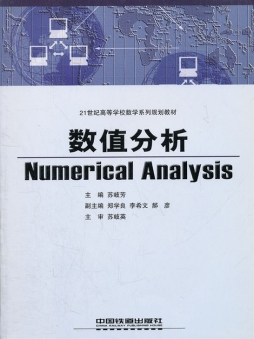数值分析
出版社:中国铁道出版社
年代:2007
定价:26.0
书籍简介:
本书采用中英文双语编写,介绍了科学计算中常用数值分析的基础理论及计算机实现方法。
书籍目录:
1 Error Analysis
1.1 Introduction
1.2 Sources of Erro
1.3 Erro and Significant Digits
1.4 Error Propagation
1.5 Qualitative Anal
1 Error Analysis
1.1 Introduction
1.2 Sources of Erro
1.3 Erro and Significant Digits
1.4 Error Propagation
1.5 Qualitative Analysis and Control of Erro
1.5.1 Ill-condition Problem and Condition Number
1.5.2 The Stability of Algorithm
1.5.3 The Control of Erro
1.6 Computer Experiments
1.6.1 Functio Needed in The Experiments by Mathematica
1.6.2 Experiments by Mathematica
1.6.3 Functio Needed in The Experiments by Matlab
1.6.4 Experiments by Matlab
2 Interpolating
2.1 Introduction
2.2 Basic Concepts
2.3 Lagrange Interpolation
2.3.1 Linear and Parabolic Interpolation
2.3.2 Lagrange Interpolation Polynomial
2.3.3 Interpolation Remainder and Error Estimate
2.4 Divided-differences and Newton Interpolation
2.5 Differences and Newton Difference Formulae
2.5.1 Differences
2.5.2 Newton Difference Formulae
2.6 Hermite Interpolation
2.7 Piecewise Low Degree Interpolation
2.7.1 Ill-posed Properties of High Degree Interpolation
2.7.2 Piecewise Linear Interpolation
2.7.3 Piecewise Interpolation of Hermite with Degree Three
2.8 Cubic Spline Interpolation
2.8.1 Definition of Cubic Spline
2.8.2 The Cotruction of Cubic Spline
2.9 Computer Experiments
2.9.1 Functio Needed in The Experiments by Mathematica
2.9.2 Experiments by Mathematica
3 Best Approximation
3.1 Introduction
3.2 Norms
3.2.1 Vector Norms
3.2.2 Matrix Norms
3.3 Spectral Radius
3.4 Best Linear Approximation
3.4.1 Basic Concepts and Theories
3.4.2 Best Linear Approximation
3.5 Discrete Least Squares Approximation
3.6 Least Squares Approximation and Orthogonal Polynomials
3.7 Computer Experiments
3.7.1 Functio Needed in The Experiments by Mathematica
3.7.2 Experiments by Mathematica
3.7.3 Functio Needed in The Experiments by Matlab
3.7.4 Experiments by Matlab
4 Numerical Integration and Differentiation
4.1 Introduction
4.2 Interpolatory Quadratures
4.2.1 Interpolatory Quadratures
4.2.2 Degree of Accuracy
4.3 Newton-Cotes Quadrature Formula
4.4 Composite Quadrature Formula
4.4.1 Composite Trapezoidal Rule
4.4.2 Composite Simpson's Rule
4.5 Romberg Integration
4.5.1 Recuive Trapezoidal Rule
4.5.2 Romberg Algorithm
4.5.3 Richardson's Extrapolation
4.6 Gaussian Quadrature Formula
4.7 Numerical Differentiation
4.7.1 Numerical Differentiation
4.7.2 Differentiation Polynomial Interpolation
4.7.3 Richardson's Extrapolation
4.8 Computer Experiments
4.8.1 Functio Needed in The Experiments by Mathematica
4.8.2 Experiments by Mathematica
4.8.3 Experiments by Matlab
5 Solution of Nonlinear Equatio
5.1 Introduction
5.2 Basic Theories
5.3 Bisection Method
5.4 Iterative Method and Its Convergence
5.4.1 Fixed Point and Iteration
5.4.2 Global Convergence
5.4.3 Local Convergence
5.4.4 Order of Convergence
5.5 Accelerating Convergence
5.6 Newton's Method
5.6.1 Newton's Method and Its Convergence
5.6.2 Reduced Newton Method and Newton's Descent Method
5.6.3 The Case of Multiple Roots
5.7 Secant Method and Muller Method
5.7.1 Secant Method
5.7.2 Muller Method
5.8 Systems of Nonlinear Equatio
5.9 Computer Experiments
5.9.1 Functio Needed in The Experiments by Mathematica
5.9.2 Experiments by Mathematica
5.9.3 Experiments by Matlab
6 Direct Methods for Solving Linear Systems
6.1 Introduction
6.2 Gaussian Elimination
6.2.1 Basic Gaussian Elimination
6.2.2 Triangular Decomposition
6.3 Gaussian Elimination with Column Pivoting
6.4 Methods of The Triangular Decomposition
6.4.1 The Direct Methods of The Triangular Decomposition
6.4.2 The Square Root Method
6.4.3 The Speedup Method
6.5 Analysis of Round-off Erro
6.5.1 Condition Number
6.5.2 Iterative Refinement
6.6 Computer Experiments
6.6.1 Functio Needed in The Experiments by Mathematica
6.6.2 Experiments by Mathematica
6.6.3 Functio Needed in The Experiments by Matlab
6.6.4 Experiments by Matlab
7 Iterative Techniques for Solving Linear Systems
7.1 Introduction
7.2 Basic Iterative Methods
7.2.1 Jacobi Method
7.2.2 Gauss-Seidel Method
7.2.3 SOR Method .
7.3 Iterative Method Convergence
7.3.1 Basic Theorems
7.3.2 Some Special Systems of Equatio
7.4 Computer Experiments
7.4.1 Functio Needed in The Experiments by Mathematica
7.4.2 Experiments by Mathematica
8 Numerical Solution of Ordinary Differential Equatio
8.1 Introduction
8.2 The Existence and Uniqueness of Solutio
8.3 Taylor-Series Method
8.4 Euler's Method
8.5 Single-step Methods
8.5.1 Single-step Methods
8.5.2 Local Truncation Error
8.6 Runge-Kutta Methods
8.6.1 Second-Order Runge-Kutta Method
8.6.2 Fourth-Order Runge-Kutta Method
8.7 Multistep Methods
8.7.1 General Formulas of Multistep Methods
8.7.2 Adams Explicit and Implicit Formulas
8.8 Systems and Higher-Order Differential Equatio
8.8.1 Vector Notation
8.8.2 Taylor-Series Method for Systems
8.8.3 Fourth-Order Runge-Kutta Formula for Systems
8.9 Computer Experiments
8.9.1 Functio Needed in The Experiments by Mathematica
8.9.2 Experiments by Mathematica
附录
附录A Mathematica基本操作
附录B Matlab基本操作
附录C Awe to Selected Problems
参考文献
内容摘要:
《数值分析》内容包括:数值分析的基本概念、非线性方程的数值解法、线性方程组的直接解法、线性方程组的迭代解法、数值积分与数值微分、常微分方程的数值解法及相应的上机实验内容。
编辑推荐:
本书是在作者多年来开设“数值分析”双语教学讲义的基础上,吸收国内外同类教材的精华,采用中英文双语编写而成。主要介绍了计算机中常用的、有效的各类数值问题的计算方法及相关数学理论。全书共分八章,包括误差分析、插值、函数逼近、数值积分和数值微分、非线性方程的数值解法、线性方程组的直接解法、线性方程组的迭代解法、常微分方程的数值解法等内容。每章由开篇、理论、应用和习题四个部分构成。
书籍规格:
| 书籍详细信息 | |||
| 书名 | 数值分析站内查询相似图书 | ||
| 9787113079871 如需购买下载《数值分析》pdf扫描版电子书或查询更多相关信息,请直接复制isbn,搜索即可全网搜索该ISBN | |||
| 出版地 | 北京 | 出版单位 | 中国铁道出版社 |
| 版次 | 1版 | 印次 | 1 |
| 定价(元) | 26.0 | 语种 | 英汉对照 |
| 尺寸 | 26 | 装帧 | 平装 |
| 页数 | 333 | 印数 | 4000 |
书籍信息归属:
数值分析是中国铁道出版社于2007.06出版的中图分类号为 O241 的主题关于 数值计算-高等学校-教材-英、汉 的书籍。
